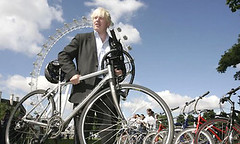Another example of who gets elected really does matter

Photo source unknown.
Just because you ride a bicycle doesn't necessarily make you enlightened when it comes to transportation policy, especially if you are a trail biker and not a city bicyclist or commuter. For the most part, trail bikers ride separate from cars...
While apparently Londoners were tired of "Red" Ken Livingstone and they booted him out as Mayor, there is no question that he was one of the best Mayors in the world when it came to focusing on optimal mobility. From launching a congestion zone to focusing resources on rebuilding the London Underground, the Livingstone Administration did a lot.
In the short few months since Livingstone was turned out, Conservative Mayor Boris Johnson is overturning various best practice mobility initiatives:
1. In early November, Mayor Johnson released a plan that will "put an end to the punishment of motorists" according to this press release, "Mayor sets out the Way to Go." According to "UK: London Mayor Declares End to War on Drivers" (via Washcycle):
The transportation guidance document repeals a number of measures introduced by Johnson's predecessor, Ken Livingstone, who sought to place the needs of buses and bicycles ahead of the drivers who make up the majority. The result of the old system was an increase in congestion." London has some fantastic transport infrastructure, but often you get the sense that solutions have been designed around the technology, rather than around the people it is supposed to serve," Johnson said in a statement.
The point is optimal mobility, not a war on drivers. As long as roads are significantly subsidized--to the tune of 50% of the cost--municipalities need to focus on how much money they spend on various types of mobility infrastructure and whether or not that is the best way to spend money in terms of maximizing the city's competitive advantage. For most cities with extant fixed rail transportation infrastructure, automobile-centric mobility policies are not the way to go.
2. The Guardian reports that "Johnson takes axe to congestion charge zone" that the Mayor is scrapping a controversial extension to the Congestion Zone. Part of the criticism is that people living in the zone would have to pay, albeit at 10% of the cost of non-residents.
Again, who says there is an inalienable right to drive at the expense of others? Congestion pricing helps capture some of that 50% subsidy of the cost of roads.
3. The Guardian also reports, in "Boris Johnson under fire for cutting London cycling funds," that redirecting money to be spent on bicycling to retiming traffic lights and other car-oriented measures demonstrates that just like with President Bush--who rides a mountain bike for fun--that just because you might ride a bicycle that doesn't make you necessarily a leading edge transportation planner...

The London mayor, Boris Johnson, with a bike in front of the London Eye. Photograph: Publishers Association.
Labels: electoral politics and influence, transportation planning



0 Comments:
Post a Comment
<< Home